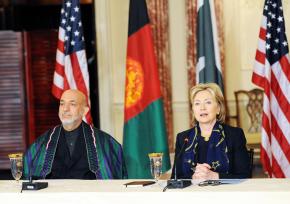The warlord election
Afghanistan will hold presidential elections August 20 amid a major offensive by U.S. and NATO troops and counterattacks by a resurgent Taliban. Even before the election, Anthony Cordesman, a top civilian adviser to U.S. commanders, stated that 45,000 more U.S. troops are needed in Afghanistan--even as opinion polls were showing Americans turning against the war.
What was once seen as an easy U.S. military victory against al-Qaeda in 2002 is now becoming a war without end, spilling over into neighboring Pakistan. While al-Qaeda has been broken up, the brutal U.S./NATO occupation has given new life to the Taliban, the fundamentalist Islamist movement that's based mainly among the Pashtun people, the largest ethnic group in Afghanistan. "This [war] will not be quick. This will not be easy," President Barack Obama said recently.
In an interview, Anand Gopal, a Kabul-based journalist, explains the dynamics of the country's elections to .
AT THE outset of the presidential campaign, incumbent Hamid Karzai was expected to win easily. Instead he is facing stiff challenges. Is the U.S. still backing Karzai?
WHILE A few months ago it looked as if Karzai would run away with the election, in recent months other contenders have narrowed the gap. The main contender is Abdullah Abdullah, who is a figure associated with the anti-Taliban Northern Alliance and served as an advisor to the famous warlord Ahmed Shah Masoud.
This is both his greatest asset and his biggest detriment. His political base consists of Tajiks who strongly identify with the Northern Alliance, and with the many Tajik warlords in the North. However, Pashtuns typically despise Northern Alliance warlords such as Masoud (whose bombs helped raze Kabul in the 1990s) and are therefore unlikely to support Abdullah.
Another leading candidate, Ashraf Ghani, lacks a political base outside of Kabul. He is a Western-educated technocrat who returned to Afghanistan after the U.S. invasion following a 24-year absence. The majority of Ghani's support comes from the West and he lacks the ability to connect with ordinary, impoverished and traditional Afghans. Neither candidate is strong enough to challenge Karzai.

Karzai is essentially the only truly national figure in the country. He has name recognition--something which is very important in a country where most people can't read and don't have access to television. As a leader with no strong ties to the Taliban or the Northern Alliance, he is able win the support of Afghans from all ethnic groups. Thus, despite the many failings of his regime, Afghans will likely vote for him because he seems better than the alternatives.
The U.S. would probably like to see someone like Ghani in charge, but they realize that it is most likely not going to happen. Instead, their policy seems to be a begrudging acceptance of another five years of Karzai.
GIVEN THE threats of the Taliban to disrupt the election, will there be large-scale abstention? What level of turnout will be seen as necessary for a legitimate vote?
IT LOOKS like many in the South and East--where the Taliban are the strongest--will stay home on Election Day. The Taliban have promised to target anyone who votes and they are also attacking polling sites.
The possibility of a low turnout is the single biggest concern for the Afghan government and the U.S. A low turnout will damage the credibility of the American effort here, since Washington would be seen as unable to ensure that democracy is taking root in the country. While some analysts may ponder which candidate the U.S. is backing, I think the more pressing strategic concern for the U.S. is to ensure that whichever candidate that's elected is seen as legitimate by the Afghans and international community.
WHAT IS the role of the warlords in this election?
THIS ELECTION marks the return of the warlords. While warlords dominated the Afghan government in the early post-2001 years, in recent times there had been a shift away from warlords in the Afghan government. Various powerful warlords were removed from their posts and technocrats were gradually introduced to key government posts.
Karzai stopped at no length to ensure his re-election chances, however, and in the process cut deals with many warlords. For example, he recruited the notorious Northern Alliance warlord Muhammad Fahim as one of his running mates, in an attempt to split Abdullah's base. Fahim has been accused of countless human rights violations, and his nomination has drawn widespread criticism human rights groups.
U.S. AND NATO troops have mounted a major offensive in recent weeks. What are the results? Has the reduction of the use of airpower reduced civilian casualties?
THE U.S. offensive in Helmand, which started in early July with 4,000 Marines invading the largely Taliban-controlled province, has had mixed results. On the one hand, U.S. forces were able to push out Taliban insurgents from some district capitals and other towns that they had been running for a number of years. But in doing so, they simply pushed the insurgents into the surrounding countryside and into other provinces. The majority of the province remains under Taliban control, except for a few islands of American control in some towns.
There has been a reduction in air power, which was called for by the new general in charge, Stanley McChrystal. But there has also been less need for the air power--the Taliban mostly melted into the population ahead of the U.S. offensive, leaving much less fighting than many Americans expected.
It is a classic guerrilla tactic--avoid battles where you are outgunned and instead exploit the weakness of the enemy, in this case by planting roadside bombs or using suicide bombs, both of which are hard to defend against.


